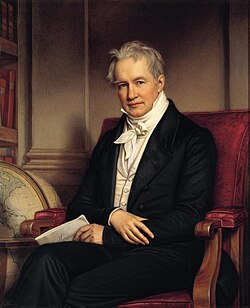Alexander Humboldt
| Alexander von Humboldt | |
|---|---|

Alexander von Humboldt (by Joseph Stieler, 1843)
|
|
| Born | 14 September 1769 Berlin, Kingdom of Prussia |
| Died | 6 May 1859 (aged 89) Berlin, Kingdom of Prussia |
| Nationality | German |
| Fields | Geography |
| Alma mater |
Freiberg School of Mines (diploma, 1792) University of Frankfurt (Oder) (no degree) University of Göttingen (no degree) University of Berlin (no degree) |
| Academic advisors | Markus Herz, Carl Ludwig Willdenow |
| Notable students | Louis Agassiz |
| Known for | Biogeography, Kosmos (1845–1862), Humboldt Current, Humboldtian science, Berlin Romanticism |
| Influences | F. W. J. Schelling Humboldt attended Schelling's lectures at the University of Berlin (Schelling taught there 1841–1845), but never accepted his natural philosophy (see "Friedrich Wilhelm Joseph Schelling - Biography" at egs.edu, Lara Ostaric, Interpreting Schelling: Critical Essays, Cambridge University Press, 2014, p. 218, and Rupke 2008, p. 116). |
| Influenced | Darwin, Wallace, Thoreau, Whitman, Emerson, Muir, Irving |
| Notable awards | Copley Medal (1852) |
| Signature | |
Friedrich Wilhelm Heinrich Alexander von Humboldt (![]() listen ; 14 September 1769 – 6 May 1859) was a Prussian geographer, naturalist, explorer, and influential proponent of Romantic philosophy and science. He was the younger brother of the Prussian minister, philosopher, and linguist Wilhelm von Humboldt (1767–1835). Humboldt's quantitative work on botanical geography laid the foundation for the field of biogeography. Humboldt's advocacy of long-term systematic geophysical measurement laid the foundation for modern geomagnetic and meteorological monitoring.
listen ; 14 September 1769 – 6 May 1859) was a Prussian geographer, naturalist, explorer, and influential proponent of Romantic philosophy and science. He was the younger brother of the Prussian minister, philosopher, and linguist Wilhelm von Humboldt (1767–1835). Humboldt's quantitative work on botanical geography laid the foundation for the field of biogeography. Humboldt's advocacy of long-term systematic geophysical measurement laid the foundation for modern geomagnetic and meteorological monitoring.
Between 1799 and 1804, Humboldt travelled extensively in Latin America, exploring and describing it for the first time from a modern scientific point of view. His description of the journey was written up and published in an enormous set of volumes over 21 years. Humboldt was one of the first people to propose that the lands bordering the Atlantic Ocean were once joined (South America and Africa in particular). Humboldt resurrected the use of the word cosmos from the ancient Greek and assigned it to his multi-volume treatise, Kosmos, in which he sought to unify diverse branches of scientific knowledge and culture. This important work also motivated a holistic perception of the universe as one interacting entity.
...
Wikipedia
